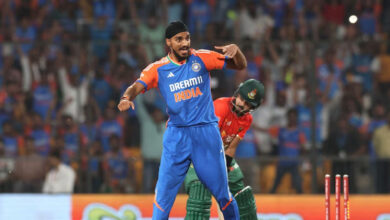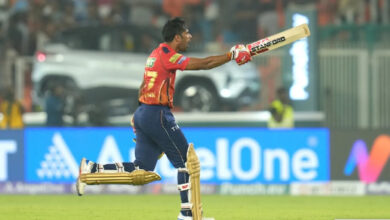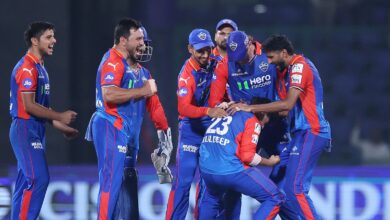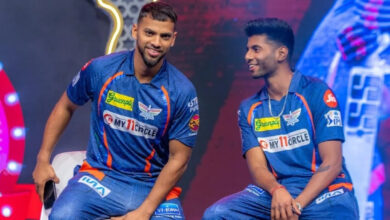‘Hope we get recognised too’: Indian badminton soars but will Indian coaches get due acclaim and remuneration? | Badminton News

Arun Vishnu is just back from the Asia Team Championships where the Indian women he coached defied all expectations to win gold. “If my wife says, don’t go for the tournament, I won’t!” he laughs. “But I know she will handle things at home. It’s not easy though,” says India’s young doubles coach, who travels extensively helping eke out tough wins, while leaving a toddler at home with former international shuttler and his spouse Arundhati Pantwane. “She’s also a coach and has her own career,” he reminds.Vishnu, a former national doubles champion, retired early as a player as he couldn’t afford travelling for tournaments, and jumped into coaching. His good outing as coach in this last week though, an Asian title no less, is the feat that will be celebrated more than his playing wins.
Treesa Jolly-Gayatri Gopichand came out victorious against a couple of Top-10 pairings to earn India crucial points while winning the title. Planning for them was a pair of Indian coaches, Vishnu along with Pullela Gopichand.
An under-appreciated fact as more youngsters burst through the ranks and get the Top-10 scalps on the big stage is the contribution of former India players-turned-coaches, who have begun to gain confidence and deliver results, while not having to depend on foreign expertise.
While the likes of Gopichand, Prakash Padukone and Vimal Kumar have ensured that some of India’s finest results in singles came under their guidance, other smaller names are only recently finding their feet in top-tier coaching, shepherding beginners towards the elite.
Vishnu has been around for the Treesa-Gayatri combine, as well as for Tanisha Crasto since the start of their partnership, and even helped Ashwini Ponnappa-Tanisha leapfrog into the lead in Race to Paris contention.
India’s Treesa Jolly, right, and Gayatri Gopichand Pullela in action against China’s Li Wen Mei and Liu Xuan Xuan during day four of the YONEX All England Open Badminton Championships at the Utilita Arena Birmingham, England. ( AP | PTI)
Both pairs made the Top 30 within a season from starting and Ashwini’s experience propelled her bold ambition of another Olympics. But Vishnu has played a major role in India now having two Top-25 combinations in women’s doubles, which is unprecedented in India’s badminton hory. His day-to-day role demands a lot of his time and mental intensity.
While the phenomenal rise of Satwiksairaj Rankireddy and Chirag Shetty can be credited to Danish Mathias Boe, the steady women’s doubles progress is a born & bred in India project as far as coaching goes.
Jwala Gutta and Ashwini reached great heights with two Commonwealth Games finals including a title and a World Championship bronze on their own steam. But Treesa-Gayatri and Tanisha-Ashwini are pushing further forward on the Tour, and increasingly turning out to be reliable in team events, nicking the big wins. A World No 6 and 10 were taken down last week.
“We need to reduce the dependence on foreign coaches. But Indian coaches will only do well and gain confidence if they earn enough to take care of their families. If we know that things will be OK at home while we are away coaching,” Vishnu says.
India’s top foreign coaches, working with the country’s elite shuttlers are reportedly paid USD 10,000 a month the top central funding bodies. Indians earn a fraction of that. And their commitment to guiding young Indian talents at the top stages is taken for granted, expected even of them, while giving back to the sport.
“But all that travelling and staying away from families and trying to build a strong foundation in doubles…I hope we are recognised too. If you want former players to get into top coaching, they should be able to financially take care of their families,” he urges.
Parupalli Kashyap, Guru Saidutt at the Gopichand academy, and Chetan Anand, Sumeeth Reddy, as well as Manu Attri independently have plunged into coaching. The situation isn’t too different in Bangalore where Anup Sridhar, Arvind Bhat, Ajit Wijetilekk and Sagar and Sayali Chopda can help India’s next generation if they are persed with.
Vishnu cites the example of veteran coach Vijaydeep Singh, who shepherded countless doubles pairings at international meets, while India was still finding its feet.
“He shifted to Hyderabad, stayed away from his family in Chandigarh. Those are huge sacrifices. Even other Indian support staff – physios, trainers and S&C coaches who travel and put in long hours. It’s tough for everyone,” Vishnu says.
Coach Siaduttullah has the respect of all top Indian names whom he travelled with during their development years. But though both the big academies of Hyderabad and Bangalore do their best to offer them decent remuneration, it is nowhere near what foreign pros will get offered.
The Badminton Association of India have announced a coaches development program for grassroots mentors in four cities, and certification and upskilling. But will the country offer competitive salaries to Indian coaches who are expected to deliver the same results, or merely expect them to carry on selflessly?







